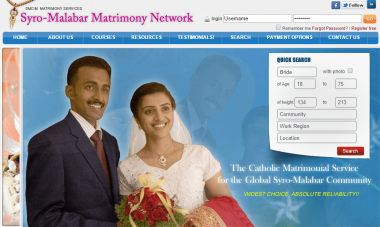Indian bishop accuses Hindus and Muslims of 'love jihad' against Christian women

The Roman Catholic Church in Kerala, South India, has launched a dating website aimed at helping to reduce the number of its young people who marry outside the faith.
But the site immediately ran into a storm created by one of the Church's bishops, who criticised inter-faith marriage and accused non-Christian communities of a "love jihad" against young Christian women by luring them into marriage outside the faith.
The Syro-Malabar Matrimony Network says that it "directly benefits young men and women who are seeking suitable life-partner from their own faith and community to start a Christian family". It allows visitors to search potential spouses by age, height, location and community, saying that "due to the increased movement of individuals and families across the globe, many young Syro-Malabar men and women find it hard to get a soul-mate of his/her choice, who will help him/her start a truly Christian family".
However, the Bishop of Idduki, Mar Mathew Anikkuzhikkattil, said that incidents of Christian girls falling into the "trap" of inter-religious love were on the rise. Referring to the Hindu pressure group Sree Narayana Dharma Paripalana (SNDP) Yogam, he said: "When a girl who lived with her parents till the age of 18, who studied at Sunday school about Christian faith till 12th class, who had grown up in our faith and tradition, walks away with a Muslim or an auto driver or an SNDP man, that shows the deficiency in our faith and teachings."
The bishop said that six out of every 100 marriages were inter-religious marriages and that most were ending in divorce.
SNDP Yogam general secretary Vellappally Nateshan said: "A case for fomenting communal hatred should be registered against the bishop. It is Christian Churches which are indulging in religious conversions with foreign aid."
The bishop's comments drew an apology from the Kerala Catholic Bishops Council (KCBC), which issued a statement saying: "We say sorry to those who felt offended by the remarks." It added: "The bishop was commenting on the increased westernisation and rising influence of neoliberal values in a traditional society such as Kerala. It was natural for a religious leader to comment on such trends at a meeting of the pastoral council of the Church."











